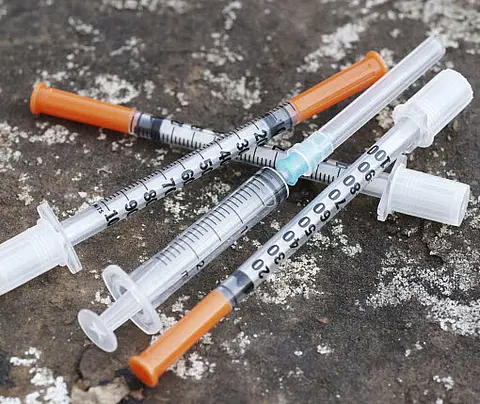RESEARCH TRIANGLE PARK, N.C. — A new study from researchers at RTI International (RTI), a nonprofit research institute, and partners found that use of unsanctioned safe consumption sites (SCS) significantly decreased the likelihood of emergency departments (ED) visits, number of ED visits, likelihood of hospitalization and number of nights hospitalized among people who use drugs.
SCS, also known as supervised injection facilities or overdose prevention sites, are an evidence-based intervention to prevent drug use-related harm where people can bring pre-obtained drugs to consume via injection with guaranteed access to sterile syringes, safe disposal of used syringes, while being supervised by trained staff who can administer naloxone or oxygen in case of an overdose. This study followed people who inject drugs for 12 months in the area surrounding the unsanctioned SCS from 2018 to 2020.
“As our health care systems continue to be overwhelmed by the growing overdose crisis as well as the ongoing COVID-19 pandemic, these results suggest that public health officials and policymakers should consider SCS as part of a comprehensive approach to address the rising levels of medical harm related to injection drug use in communities across the country,” said Barrot H. Lambdin, PhD, lead author and senior implementation scientist at RTI.
According to the researchers, there are a couple of possible explanations for these findings. First, participants who experienced opioid-involved overdoses at the SCS could be treated with naloxone and monitored onsite, preventing the need for overdose-related ED visits. Second, although no licensed, board-certified health professional was working on-site, staff at the SCS could have triaged participants and referred those with SSTIs to primary care before complications developed, thereby reducing the need for ED visits and hospitalizations.
The Centers for Disease Control and Prevention estimates that nearly 841,000 Americans have died of a drug overdose since 2009, and since the COVID-19 pandemic, overdose death rates have increased 30% compared to the prior year. Study results suggest that people using unsanctioned SCSs may be somewhat less likely to experience a fatal or non-fatal overdose and have fewer non-fatal overdoses.
These findings were published in Journal of General Internal Medicine, the official journal of the Society of General Internal Medicine. To read the full journal article, click here.

- A new study has found that that use of an unsanctioned safe consumption sites (SCS) significantly decreased the likelihood of emergency departments (ED) visits, number of ED visits, likelihood of hospitalization and number of nights hospitalized among people who use drugs.
- This study followed people who inject drugs for 12 months in the area surrounding the unsanctioned SCS from 2018 to 2020.
- These findings were published in Journal of General Internal Medicine, the official journal of the Society of General Internal Medicine.
To request an interview, contact our Media Relations team.
